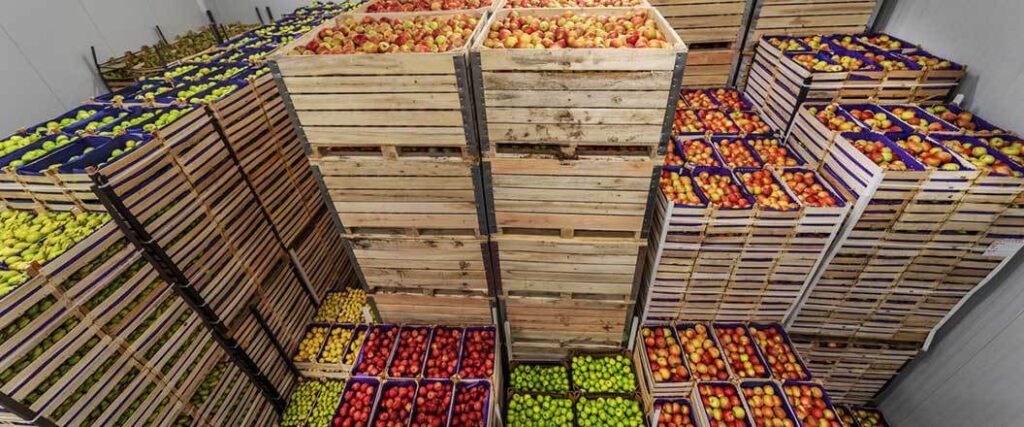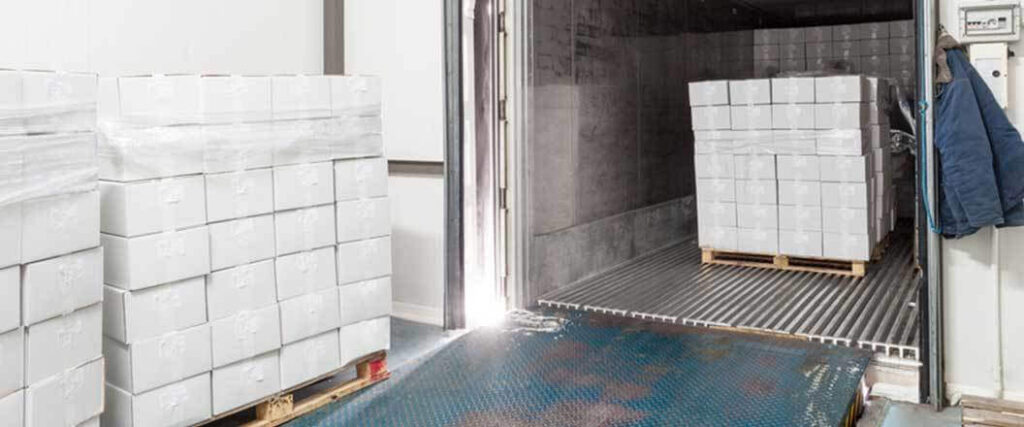Challenges in cold chain logistics make the shipping and storage of frozen goods a very unforgiving process. When undertaking shipping or storage operations for frozen goods, it’s important that you're prepared for the potential challenges your frozen goods will face.
Some of the challenges in cold chain logistics that your freight could face include some of the following:
Fortunately, the right cold chain provider will help you overcome these challenges.
We’ll go over the challenges in cold chain logistics as well as show why working with an experienced company like USA Refrigerated Freight is your best option.

Transporting perishable goods is difficult and requires a large number of logistical considerations. While carriers and logistics providers do their very best to handle goods safely and efficiently, there are many things that can go wrong.
We’ve provided more information on some of the cold chain logistics challenges that could harm your shipment.
One severe problem in the cold chain is the threat of microbial growth on different products. While many temperature sensitive items require a cold environment, microbial growth is a severe problem within many freezers and refrigerators.
Microbial contamination can occur in:
Typically, foods that have a high concentration of acids and vinegars are less likely to suffer from this type of contamination. Nonetheless, this is a challenge that you can expect when using cold chain logistics.
Damaged goods and products are fairly natural occurrences in cold chain logistics. There are many reasons that temperature-controlled products can sustain damage while in transit.
Some of these reasons include:
Many companies in the cold chain do their best to handle all shipments with care. Nonetheless, mistakes can occur and cooling systems can malfunction which causes damage or loss to sensitive products.
Poor packaging on part of shippers is another challenge facing cold chain logistics. Perishable goods are susceptible to temperature changes or expiration after certain lengths of time. They can also be damaged or totally lost if they’re not packaged safely.
Using a poorly tapped box with no cushioning isn’t going to provide your food with good enough protection during loading and unloading. Mistakes like this are why poor packaging is a common cold chain issue.
Although refrigerated goods need to stay in the appropriate cold temperatures, it isn’t bad for these types of goods to be in warmer temperatures briefly. However, prolonged exposure to a warmer environment will have a detrimental impact on the products. Oftentimes, heat exposure occurs during the loading and unloading process on the dock.
To counteract this, many cold chain logistics providers train their employees to load and unload their freight at an extremely fast pace to avoid this type of exposure. Our article on cold chain in agriculture has some more useful information on how safely keep fruits, vegetables and other perishable goods safe while in transit.
A vehicle breakdown is one of the worst things that can happen when it comes to the transportation of temperature controlled products. When a truck breaks down, several things tend to go wrong.
Perishable goods stuck in broken-down trucks face the following issues:
Truck breakdowns happen for many reasons. Most don’t have anything to do with the refrigeration unit itself, but can still affect the timing of delivery. The tighter the deadline, the more likely these delays lead to problems.
| Road Side Repairs | Occurrence By Percentage |
| Tire | 51.3 Percent |
| Jump or Pull Start | 7.6 Percent |
| Alternator | 4. Percent |
| Wiring | 3.9 Percent |
While semi trucks are durable and rugged, they do get worn down over time. Breakdowns can occur, which can put a real damper on your cold chain operations. To minimize the likelihood of their trucks breaking down, many cold chain logistics providers require their drivers to perform maintenance checks on their trucks.
They do this by having their drivers fill out inspection sheets after finishing their shifts. The inspection sheets reveal what parts of the truck need to be fixed so that it can continue to stay operational.
Condensation is another problem that cold chain management frequently runs into. When products go from cold temperatures into warmer ones, condensation is natural.. Unfortunately, one of the causes of microbial growth in perishable goods is condensation.
Condensation causes microbial growth under the following conditions:
Water from condensation usually forms on the surface of the walls or on the items themselves. When condensation occurs on a surface that may not be clean, it could adversely impact the food without consumers even realizing it, thus putting their health at risk.
Our article on healthcare cold chain logistics will help you when shipping medical items.
The last problem facing chain logistics we’ll discuss is freezer or cooler damage. If either of these devices has some type of malfunction, your temperature controlled products will suffer because of it.
Some types of damage that freezers and coolers could have include:
Damage to these parts of freezers and coolers can have a negative impact on their ability to provide cold storage for temperature sensitive goods. Reefer trailers can also have damage that prevents them from providing a cold environment for cold goods as well.
Damages that reefer trailers are susceptible to include:
Having functioning equipment is important for maintaining the temperature in the trailers, freezers and coolers. To rectify this problem, many cold chain logistics providers perform routine maintenance on their equipment. This ensures that if anything starts to malfunction on their reefer trailers, freezers, or coolers, they’ll be able to address the issue before it gets out of hand.
Before shipping your perishable goods off, check refrigerated freight rates so you’ll know what you’ll be paying when you ship.

There are many different regulations that go along with transporting food and pharmaceutical products. Cold chain logistics solutions place significant emphasis on such regulations, but it’s meant to help shippers of sensitive products stay in accordance with Food and Drug Administration (FDA) regulations.
Some of the subchapters that are applicable to refrigerated goods include:
The processes used by cold chain logistics to ship and store products like these are designed to abide by FDA regulations. This ensures that your goods are not only in compliance with the FDA's rules, but that they are safe to consume.

Cold chain logistics are an essential service when you need to ship and store perishable and temperature sensitive goods. Moving goods like these, often within a short time frame, is a task that requires a high degree of accuracy.
Even with all of the challenges it faces, cold chain logistics is able to provide the following:
Another reason cold chain logistics are so essential is that no other shipping service can move temperature controlled goods for you. Regular dry van shipping is too hot to provide safe transport for sensitive goods.
If you only ship temperature sensitive goods on an infrequent basis, then investing in a cold chain logistics provider isn’t worth it. However, if you’re a farmer or rancher, having a dedicated cold chain logistics provider is necessary. A cold chain logistics provider will be able to handle every aspect of the transportation process so you don’t have to.
Thanks to cold chain logistics, shippers can enjoy the many benefits of temperature controlled shipping.
USA Refrigerated Freight is a reliable cold chain transportation company that you can rely on. With a fleet of trucks and numerous drivers with years of experience, you can count on us to make sure your freight gets to its destination on time.
On top of our reliable shipping capabilities, you’ll have access to competitive rates and top-quality partners serving a variety of industries.
Fill out your quote below or get in contact with our team at (866) 849-4923 if you have any questions about our shipping services.
USA Refrigerated Freight
315 NE 14th Street #4122
Ocala, FL 34470